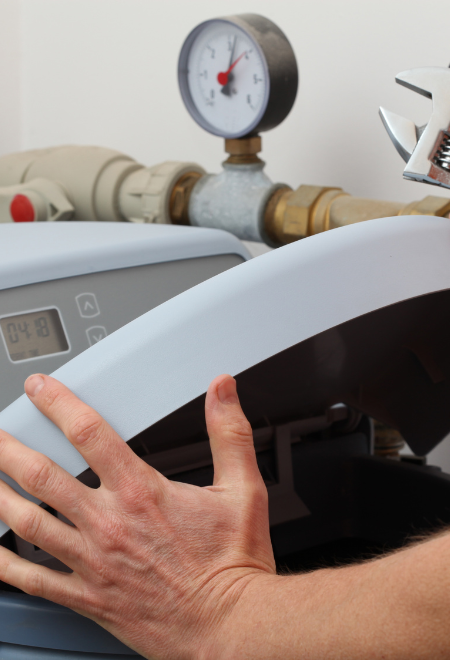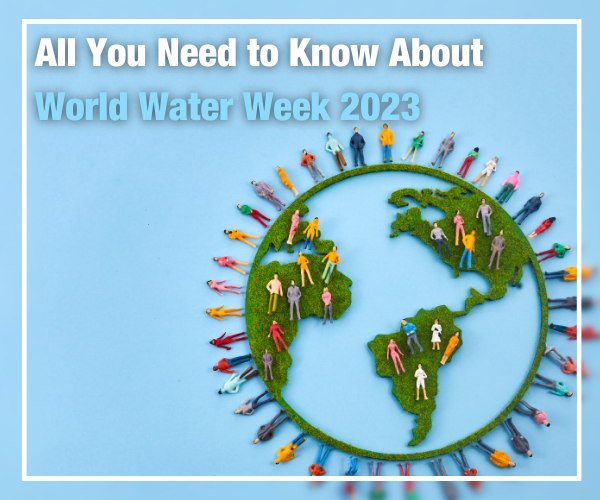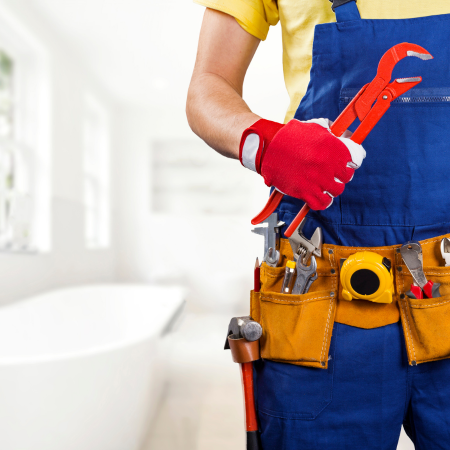In recent years there has been a sharp rise in the domestic installation of Water Softeners in the UK, as more and more homeowners are making the investment - and subsequently making hard water a problem of the past.
Water Softeners help remove unwanted minerals such as calcium and magnesium to improve the quality of water, prevent the build-up of limescale and increase the longevity of boilers, washing machines and dishwashers.
The experts at City Plumbing have answered several frequently asked questions regarding water softeners to assist you in selecting the right unit. We’ll discuss in depth about the types available, the installation costs and how they can also help you save on your monthly utility bills.
How Do Water Softeners Work?
Convenience is key with Water Softeners, as you can simply turn them on and allow it to do its thing.
Salt based Water Softeners use a method called Ion Exchange. This means that inside the softener will be a resin bed full of beads with a negative charge.
Salt-based water softeners use a different method called Template Assisted Crystallization (TAC) to remove the hard minerals like salt-based water softeners do.
When correctly installed, the hard water will flow through the resin bed, and the magnesium ions and calcium in the water are attracted to the beads, which are then exchanged for sodium ions. The sodium ions are then flushed down, leaving the water in your property softer.
Which Water Softener Should I Buy?
In a previous article, we discussed in depth about the four most common types of Water Softeners available on the market. The types available are; Salt-based, salt-free, dual tank and magnetic water softeners.
There are a few aspects to consider when selecting a water softener for your home, such as the hardness of the water in the area and the size of the property, because some Water Softeners have a larger capacity which is best suited for larger homes.
It is essential to set a budget, do some research and read reviews before choosing, as there are many different brands available which can all vary in price.
How Much Are Water Softeners To Purchase?
The price of a Water Softener can change depending on the size of the softener, plus any additional features that the unit might come equipped with.
Big Water Softeners such as the BWT Perla range - provide a 15-litre salt capacity meaning they are best suited for larger properties to tackle harder water and limescale build-up easier, but typically these units are more expensive.
Nowadays, many Water Softeners come with Wi-Fi for easy control, and a range of additional features that can combat hard water more effectively, such as:
- Timers - A timer will allow you to control when your water softener regenerates, saving you water and salt.
- Digital displays - A digital display on your water softener will provide important information about the hardness of your water, the amount of salt used, and the regeneration cycle.
- Self-cleaning systems - Automatically cleaning your water softener can increase the unit's longevity.
- Backwash valves - The backwash valve will allow you to flush the resin bed in your water softener, increasing the unit's overall performance.
- Salt-free systems - Salt-free water softeners are more environmentally friendly than a typical water softener as it uses a different process to remove hardness from water.


Can Water Softeners Cause Itchy Skin?
Some people with already dry skin may experience additional itching or dryness when showering with a water softer.
Water softeners are known for providing a range of health and lifestyle benefits - and due to the removal of hard minerals, water softeners help promote silkier hair and smoother skin whilst reducing the amount of bodywash or shampoo needed to break through the minerals from hard water.
On the other hand, water softeners could cause dry itchy skin, however, there are a few things you can do at home to help against dryness symptoms, like;
- Use a humidifier to add moisture to the air.
- Apply moisturiser to the skin.
- Take lukewarm baths.
- Avoid harsh soaps and detergents.
How much do Water Softeners cost to install?
Water Softeners are a great investment for your property; however, the cost of installing a water softener in the UK can vary depending on the size and type of softener and the location of the installation.
Typically the cost of installation is generally between £350 and £1,500, depending if your plumber needs to create a separate dedicated water supply or if your plumber is replacing the unit like-for-like.
Can Water Softeners Descale Pipes?
The softener will not only remove impurities from the water but will also help to descale pipes and fixtures, reducing the risk of clogs in the plumbing system. It is also recommended to have a water filter as they can also help prevent limescale and you can also flush out your plumbing system once in a while using a vinegar solution which can also help.
Optimal place to Install A Water Softener?
Typically a Water softener will get installed on your mains water supply, usually under the kitchen sink where it's more accessible. They can, however, get installed anywhere on the mains water supply, for example, in a garage.
A Water Softener will have a waste pipe outlet, so you will need to ensure the unit gets installed next to an external wall to allow the waste pipe to feed out.
How Regeneration Works With A Water Softener?
There are two main types of regeneration: manual regeneration and automatic regeneration. Manual regeneration requires you to turn a valve or press a button to start the regeneration process, while automatic regeneration starts the process at a predetermined time which is usually based on the amount of water used.
The process usually takes about an hour; during this time the resin tank is flushed out with the brine solution, which is just a mixture of salt and water that collects the impurities out of the water.
There are a few things involved during the regeneration process.
- The water softener valve is turned.
- The brine tank will fill with the brine solution.
- The solution is flushed through the resin tank.
- Magnesium ions and Calcium are drawn from the resin beads and replaced with sodium ions.
- The brine solution is then drained from the resin tank.
- The valve is turned back into the normal position.

Why Water Softeners Are Important
Water Softeners are great to have as they will help reduce the build-up of limescale inside fixtures and pipes, reducing the strain on your plumbing system and can increase the life of your household appliances.
It will also help save time and money on any unnecessary plumbing repairs that may occur down the line.
Whether you’re a homeowner, a professional plumber, a housing provider, or just require more expert advice -get in touch or contact your local branch.
City Plumbing has a vast variety of Water Softeners available - with next-day delivery options available.
Other articles

How to install a Water Softener: Step by Step
10 Aug 2023 ・ 5 mins

World Water Week 2023
21 Aug 2023 ・ 5 mins

How to spot a water leak - 10 easy ways
17 Jul 2023 ・ 7 mins

Top 5 Hygiene Products To Help Prevent Legionella
12 May 2023 ・ 5 mins



